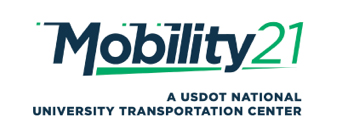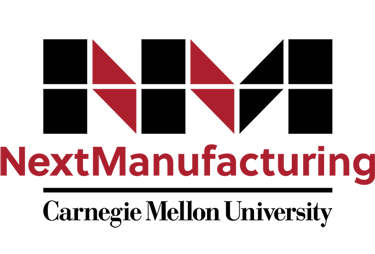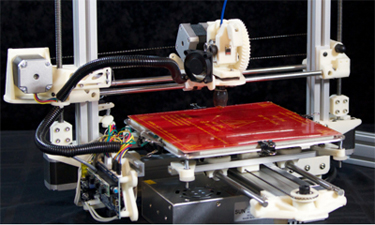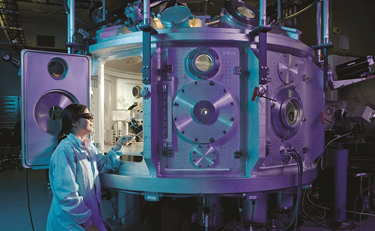
The Accelerator has successfully incubated institutes, centers, and programs that now contribute to the cutting-edge research taking place in the College of Engineering.
Programs, centers, and institutes

Manufacturing Futures Instutite
The Manufacturing Futures Instutite (MFI) leads the digital transformation of manufacturing. Through groundbreaking research, the MFI accelerates innovation for economic prosperity. The Initiative’s unique, collaborative culture drives the necessary convergence of Carnegie Mellon’s areas of expertise, while also cultivating robust partnerships with industry partners, government partners, and non-profit organizations. The Accelerator provides programmatic and administrative support the MFI, which is a university-wide initiative.

Carnegie Bosch Institute
The Carnegie Bosch Institute (CBI) is a unique alliance between Carnegie Mellon University and the Bosch Group, a leading global supplier of technology and services headquartered in Stuttgart, Germany.
CBI was established as an entity within Carnegie Mellon in 1990 through a major endowment gift provided by the Bosch Group. The purpose of the Institute aligns with CMU’s top research competencies in areas of ever-growing importance for global industry: we focus on topics of innovation at the intersection of business and technology, essentially related to our increasingly connected world and Internet of Things.
Carnegie Bosch is now housed at the Accelerator.

Mobility21
Mobility 21, a national University Transportation Center, focuses on safely and efficiently improving the mobility of people and goods in the 21st century. Mobility21 investigates and deploys novel technologies, incentives, policies, and training programs, while also exploring smart city technologies, connected and autonomous vehicles, data modeling for monitoring traffic control systems, and more. The Accelerator supports the research administration of this university-wide initiative.

NextManufacturing Center
The NextManufacturing Center is one of the world’s leading research centers for additive manufacturing (AM), which is often referred to as 3-D printing. The Center leverages multi-disciplinary knowledge to develop an innovative approach to AM, including design optimization, materials selection and characterization, process parameter mapping, software development, final part inspection, and qualification. The Center develops tools for AM that impact and benefit a wide range of additional advanced manufacturing processes. The NextManufacturing Center will also educate and train the next generation of AM experts through creative, hands-on problem-solving in the College’s innovative maker facilities. The NextManufacturing Center is housed at the Accelerator and was one of the Accelerator’s earliest, successful research incubation efforts.

Pennsylvania Infrastructure Technology Alliance
The Pennsylvania Infrastructure Technology Alliance (PITA), a Pennsylvania Department of Community and Economic Development program, provides economic benefits to Pennsylvania through the transfer of knowledge, the discovery of new technologies, and the retention of highly educated students.
PITA is a collaboration between the Commonwealth of Pennsylvania, Lehigh University’s Center for Advanced Technology for Large Structural Systems, and Carnegie Mellon’s Engineering Research Accelerator.
PITA’s research and education projects offer collaboration opportunities to Pennsylvania’s companies, faculty, and students. PITA-sponsored programs have led to the creation and implementation of numerous cutting-edge technologies in Pennsylvania’s companies. These programs have also enabled several start-up companies to form within the Commonwealth.

Manufacturing PA Innovation Program
The Manufacturing PA Innovation Program is a core component of Governor Tom Wolf’s Manufacturing PA Initiative. The Program leverages the internationally acclaimed science and engineering found at Pennsylvania’s institutions of higher education to ensure that Pennsylvania remains a national and international leader in manufacturing, achieving the full economic potential for high-paying manufacturing jobs.
The Manufacturing Fellows Initiative, one of the Manufacturing PA Innovation Program’s main components, supports designated undergraduate and graduate student fellows at PA universities to work with PA manufacturers. Industry partners identify potential projects and then team up with faculty and students to help advance new products or process innovations. The Accelerator manages this state program, which includes multiple universities across Pennsylvania.
Learn more about the Manufacturing PA Innovation Program.
Dowd Fellowships
The Phillip and Marsha Dowd Engineering Seed Fund was established in 2001 through Philip and Marsha Dowd’s generous gift to the College of Engineering. Each year, the fellowship grant program awards multiple fellowships to doctoral graduate students in the College of Engineering, providing support for graduate students who have proposed work on cutting-edge research projects.
The Fellowships aim to enable future external research funding, as well as possible future entrepreneurial activity, by generating initial research results through the seed project. Four students receive the Dowd Fellowship each year, and so far over 60 students have been supported since the Fellowship’s inception. The Accelerator manages the Dowd Fellowship on behalf of the College of Engineering.

Steinbrenner Institute Doctoral Fellowship
The Steinbrenner Institute Doctoral Fellowship program provides support to highly qualified, second-year doctoral students, across all seven Colleges at Carnegie Mellon, who are involved in environmentally-focused, interdisciplinary research projects. The Steinbrenner Institute funds projects that align with their strategic focus areas, which are energy transition strategies, as well as urban infrastructure and sustainable cities.
The Accelerator supports the Steinbrenner Institute.

Bioengineered Organs Initiative
The Bioengineered Organs Initiative aims to save lives by increasing the number of organs available to patients in need. The multi-disciplinary research team designs, creates, and tests revolutionary, long-term replacement organs engineered from a combination of bio-printed materials, which are both cellular and synthetic. This lifesaving technology could eventually eliminate the current organ transplant waiting list.
Carnegie Mellon’s collaborative research includes 3-D printing, tissue engineering, biomaterials, cellular mechanics, and artificial organs that can support or replace diseased organs. These bioengineered organs can improve the survival rates of millions of patients suffering from end-stage organ failure in the United States.
The Bioengineered Organs Initiative is the first formal, next-generation research initiative directed by and incubated within the Accelerator.

Remanence Computing Initiative
The Remanence Computing Initiative conducts transformational research on a new computing platform and architecture, which would fuse CPU, memory, and storage together in a single and powerful chip. This research will enable an exponential increase in computing capability and data storage. It will also drastically reduce size and power requirements, which will enable on-platform machine learning and pervasive artificial intelligence. The Remanence Computing Initiative is a moonshot project supported by the Accelerator.